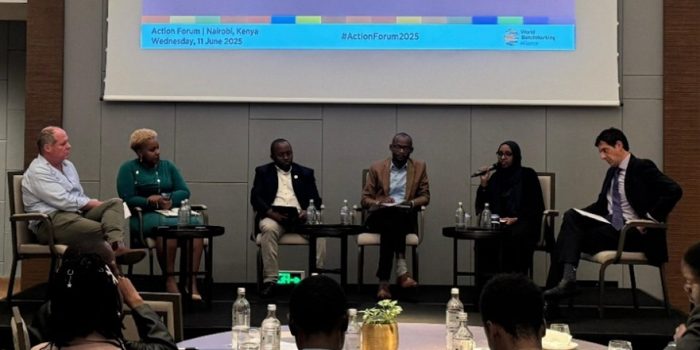Session 2 – Global supply chain shifts: Opportunities and Risk for East African stakeholders
This interactive workshop brought together civil society, business leaders, policymakers, and development agencies from Kenya and East Africa to explore how evolving global supply chain policies are shaping the region. With a focus on the UN Guiding Principles on Business and Human Rights (UNGPs), participants will examine how these principles are currently implemented locally and what the future holds as international regulations, such as the EU Corporate Sustainability Due Diligence Directive (CSDDD), take effect. The session will highlight the opportunities and challenges these policies pose for East African stakeholders, especially those engaged in food and extractive industries. Through case studies and dialogue, the workshop has attempted to foster collaboration and practical insight into how the region can adapt and thrive in the face of growing demands for ethical and sustainable supply chains. Participants engaged in an interactive dialogue on how best to ensure that any advancement of human rights and responsible business conduct in global markets reflects the needs and views of stakeholders in East Africa.
Discussion points and summaries
The session on Supply Chains and Local Impact in a Global Trade Landscape opened a very candid conversation about how the changing global trade landscape, especially newer regulations from the EU and North America, is sending ripples through supply chains in Kenya and the wider East African region.
The session was attended by participants from government, civil society, the private sector, and international organizations. There was a shared concern that many of these new laws, intended to make supply chains more ethical, climate-resilient, and transparent, often land very harshly on small-scale producers and exporters in the Global South. This is especially problematic because these voices are often excluded from shaping such regulations.

Picture: Panel line-up for session 2 of the Nairobi Action Forum
One powerful takeaway from the discussion, on the real implications of EU regulations, particularly for agricultural producers, was how laws like the EU Corporate Sustainability Due Diligence Directive (CSDDD) can create unintended bias against small-scale producers in Kenya. For instance, a smallholder avocado farmer outside Nairobi might spend an entire season producing high-quality avocados, only to find that a sudden update to EU pesticide standards renders the produce unexportable. The likely result is that the farmer in the example will be forced to either dump their stock into the local market or suffer major financial losses.
These kinds of regulatory shifts, when not properly communicated or timed, result in significant harm. Export-bound crops end up flooding local markets at very low prices, compounding financial strain on small-scale farmers. This frustration was strongly felt across the room, captured by the recurring question – “Why are the rules changing without consulting the people most affected?”. In response, participants called for a more inclusive approach to sustainability and standard-setting, one that engages producers, brokers, farmers, cooperatives, and exporters before such rules are enforced.
Key takeaways
- Businesses play an important role in determining our progress on the SDGs. Companies, especially large global companies have an enormous reach, and can influence how the SDGs are advancing even beyond their country of headquarter.
- Companies attending the session are generally aware of their role in the global supply chain and advancing sustainability. The key is balancing between emerging regulatory requirements, while creating value in Kenya, as to balance between environmental concerns and the desired social and economic outcomes. Also noting that businesses do not yet always comply to regulations, and that businesses operating at different scales have different capacities to comply with increasingly stringent regulatory requirements.
- Given the interrelated nature of the world’s supply chain, regulations such as the EU CSDDD and CSRD will inevitably affect how companies operate in Kenya. Additional care should be taken, to avoid unintended biases against small-scale producers and SMEs who might not have the same capacity and resources as larger-scale producers to comply with new standards and regulations. A more inclusive process for standard setting is needed.